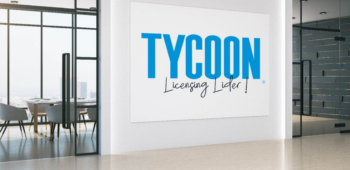By Gary Symons
TLL Editor in Chief
This month in the Global Guide to Licensing Agencies we’re featuring Tycoon, the largest agency in Latin America, with offices throughout the region.
Tycoon was founded by brothers Elias and Alberto Fasja-Cohen in 1990, at a time when the licensing industry was virtually unknown in their home country of Mexico. The two brothers are true pioneers in the licensing industry in Latin America, and today, more than 30 years later, Elias Fasja remains as the CEO of what is now the largest licensing agency in the region.
Fasja says the company came about largely because he and his brother wanted to switch from being licensees to licensors beyond Mexico’s borders.

“We were licensees back then, working with fashion brands like Christian Dior, Cacharel, Perry Ellis and Cherokee,” Elias recalls. “At the beginning we were toying around with what was possible and it was a side business at the time, but as it turned out we were very early in catching the wave that became the licensing sector in Latin America.
“Because of our knowledge in the merchandising and retailing industry, we really were able to change the rules of the game as it existed back then,” Fasja explains. “The licensing business was managed by people coming mainly from advertising agencies that had the relationship with the studios, and they became their agents, but they didn’t have any kind of industry benchmarks or knowledge of the market, whereas my brother and I were already licensees and selling through various retailers, so it was easy for us to establish the industry/economic benchmarks, because that’s the understanding we had.
“Pretty soon we started multiplying the sales numbers of our clients, sometimes by tenfold, because we had market knowledge that at the time was pretty unique.”

Fasja also says that the principles that guide Tycoon today are exactly the same as when the business launched, those being to hire the best talent possible; to establish strict policies that provide transparency and accountability to Tycoon’s customers; to provide local knowledge in national and regional markets, and to always search for data-driven intelligence on new trends or technologies.
“If I had to choose one thing, I would say the core of our success, has been betting on talent,” Fasja says. “I feel we have the best talent in the region, and yes, getting the best talent is expensive, but it is the key to success.”
Speaking of talent, Chief Revenue Officer (CRO) Arturo Czonstkowsky says one of the other key differentiators for Tycoon was the decision to invest in local talent by opening regional offices. Today, Tycoon has approximately 40 employees working outside the head office in Mexico, spread across the region in branch offices based in Brazil, Argentina, Chile, Ecuador, Peru, Central America, and Colombia.
The reason is that, just as Latin America has different languages and cultural norms than North America, each country within Latin America is also unique, with major cultural and economic differences.
“Each country is completely different,” Czonstkowsky says. “There are many people who think Latin America is like one big country and everyone is basically the same, but it’s not like that at all. It would be like saying France is the same as Germany!
Supercharge Your Licensing Business With AI-Powered License Selector
“When you speak to an Argentinian or a Colombian, it’s a different accent, there’s a different culture, and of course the market and the retail landscape is also different in these different countries, so you need to think of each country as a unique opportunity in a unique market.
“That’s why we decided we need more depth in the different territories, hiring local people, and as a result we have been growing rapidly thanks to our local teams.”
The strategy has paid off in a couple of different ways. The first is that for most licensors from outside Latin America, the cost of establishing a licensing operation in the region is much higher than simply hiring Tycoon.
But even for the largest licensors, Czonstkowsky says there are times when the size and complexity of the region makes it too difficult to cover all the bases.
“For example, we had one major client who decided to establish their own operation here in Latin America, and they even said they were going to hire away some of their staff,” he recalls. “But much later I was speaking to them and asked them how it was going, and they said, it’s frustrating, nobody is calling us back. I knew the reason why; it’s because these licensees and retailers deal with Tycoon on many different projects, and so they always answer our call first.”
In other cases, Fasja explains that major licensors will often put an office in the largest markets, those being Brazil and Mexico, but trying to cover Central America and the many nations of the CSA (Central South America) is too difficult and too expensive.
“In those cases, they are getting only two-thirds of the potential business in Latin America,” Fasja explains. “Because we have coverage throughout the entire region, even the largest licensors will turn to us so they can extend their programs into the CSA.”

A quick perusal of Tycoon’s list of top clients confirms that theory, as even giants like Microsoft, MGM and Authentic Brands Group rely on the agency to handle their licensing programs in part or all of Latin America. ABG, for example, is among the top five licensors in the world with a vast licensing division of its own, and yet they work with Tycoon in all Latin American territories.
Part of the reason, Fasja says, is that his goal was to create as much transparency for clients as they would have if they operated their own office. As CEO, Fasja drilled into all of his staff the need to maintain strict rules and procedures. In the early days, when the epitome of rapid communication was the fax machine, Tycoon had a hard rule that any inquiry to the company had to be answered within 12 hours, with no exceptions.
The company was also among the first to build specialized licensing software, not just to increase efficiency, but to provide complete transparency and effective reporting to clients and partners. “As a result, whenever there has been an audit, we have always been congratulated because we have worked hard to simplify the task of providing the transparency our clients need,” he says.
Dalia Benbassat, the company’s VP of Corporate Relations & Acquisitions, says another key to client loyalty is Tycoon’s ability to bring products to retail, in a region where the retail landscape is very different than in Asia, North America or Europe.
“We always say that the true battleground is retail,” Benbassat says. “That is what Elias sometimes calls the gates to Heaven or Hell, because it is where your program succeeds or fails.
“Working with retail is truly central to everything we do. We place a special focus on establishing relationships with the key retailers in each region, in each tier, and we work closely with them in strategic decision making, marketing and so on,” she adds. “Also, not every licensee has the same strengths, so you need to also select them by their individual strengths and how they align with the retail plan.”
Fasja, who has several decades of experience working with retailers, both at Tycoon and with his apparel company, says this is also the reason Tycoon is a good choice for both large and small licensors.
Trump Loses Copyright Battle Over Use of Song ‘Electric Avenue’
“Sometimes there are companies who say, ‘Well, you have such a big portfolio, so I don’t think you’re going to pay much attention to my project’, but to me, every client and every program is important.
“As well, that powerful portfolio is what gives us leverage at retail,” he adds. “It is what gives us the ability to go to a large retailer and say, ‘You know what, I need you to try this brand. I think you can trust me and give us some room for this new property, and because we bring them so much business, the track record for our new licensors has been very good through the years.”
That also brings Fasja to one of the central pillars of his business model, which is to always stay ahead of the curve on trends and technology, and as he puts it, “to gamble on the future.”
“We have always been ahead on the trends,” he says. “For example, we were betting on Anime long before the pandemic. During the pandemic is when it exploded, and we were there several years before then, in gaming and all kinds of things.
“We have always liked betting on the future, working to be ahead of the curve, and that has been a key to our success, because when the right time comes for a particular trend, we are already there, and we have the right property in our hands to take advantage of that trend.
“This is why working with a new licensor, who perhaps is not so well known today, is so important to us.”
Tycoon’s success in recent years has been tempered by the fact many regions in Latin America were harder hit by the COVID-19 pandemic than nations in Europe and North America.
“I think overall that in Latin America, it took us more time to recover from COVID than some other regions because we didn’t have any support from the government,” Czonstkowsky explains. “In places like the US or Europe companies and independents received support from the government. My wife, she’s American, and she was getting her bills paid each month, but in our countries, we had to solve the situation by ourselves.
The Latin American economies were very severely impacted and so it took us more time to recover.”
That said, Czonstkowsky says the Latin America economy is building momentum, and presents an excellent opportunity for global licensors. Mexico, for example, recently became the number one exporter to the US globally, beating out China, as just one sign of the upswing in regional fortunes.
“Right now, we are in much better shape, and speaking personally, as Tycoon, we had an extraordinary year in 2022, in 2023 it was better, and 2024 looks even better still.
“So we’ve been getting the pace again and growing to overcome challenges all over the region.”
Benbassat says part of that is due to the overall economic recovery in several countries across Latin America, but it’s also due to the experience and corporate culture within Tycoon, which has overcome many previous economic challenges over the decades.
“Tycoon brings a lot of knowledge, expertise and intelligence to the table,” Denbassat says. “We know the differences from country to country, and we’re able to apply that knowledge to what we do every day.
“We also work with people who are incredibly committed,” she adds. “Most of our top executives have been with us for several years, decades even, so there’s this culture of people constantly learning and then applying what we learn to our clients’ programs.
“Internally, there is true affection and mutual respect in our team which helps the culture too, and I believe that translates to success in business, not just in the good times, but in the hard times as well.”
